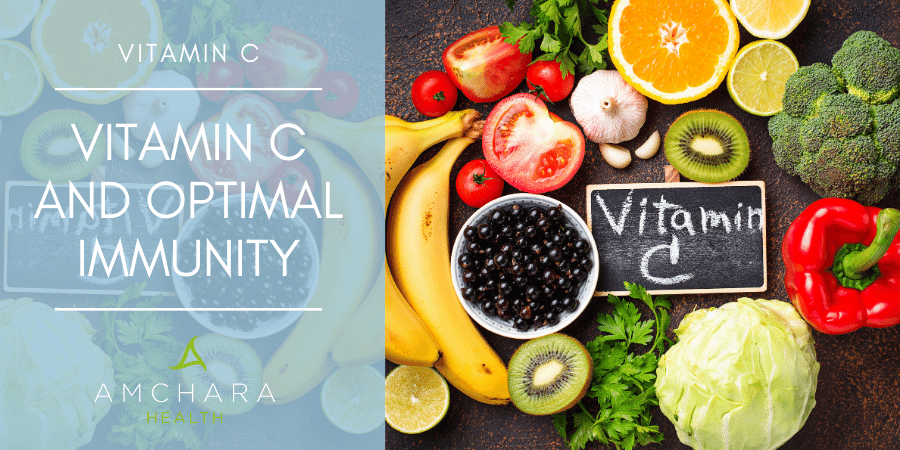Vitamin C is perhaps one of the most well known vitamins, but what health benefits does it bring and how does it work? One of nature’s favourite remedies, vitamin C is a useful way to boost your immune system and protect your general health throughout the year.
We always take an evidence-based approach and aim to provide you with actionable knowledge and tips to help you on your journey to optimal health. In this article we’ll take a closer look at vitamin C and how it can help support and optimise your immunity.
Why is Vitamin C so essential to your health?
Vitamin C has been extensively researched and has an important role in a number of functions in the body. Vitamin C is a powerful antioxidant and is also one of the most important water-soluble vitamins. It is essential for a range of functions, with virtually all of the body’s cells depending on it.
As well as supporting the immune system, vitamin C is necessary for:
-
protein metabolism
-
wound healing and tissue repair
-
collagen synthesis
-
energy production
-
increasing iron absorption in the gut
-
as a co-factor involved in neurotransmitter synthesis
-
protection from free radical damage
Support your immune system with vitamin C
Vitamin C deficiency is associated with a suppressed immune system. Several cells of the immune system can accumulate vitamin C and need this vital vitamin to perform their tasks. Scientific research has identified vitamin C concentrations in the blood plasma and white blood cells decline during periods of infection and stress.
It is thought one of the mechanisms by which vitamin C improves the function of the immune system is by increasing the activity of anti-microbial and natural killer cell activities, as well as having direct antioxidant capacities, offering cells protection against free radical damage generated during the inflammatory response.
Studies have shown that vitamin C aids the action of neutrophils, a type of white blood cell used by the immune system as the first line of defence against invading bacteria and viruses.
Vitamin C also influences the proliferation of T-cells, responsible for either killing off infected targets or releasing enzymes to destroy them. T-cells do this by producing an army of cytokines as well as helping B cells produce the molecules needed to control inflammation. Additionally, vitamin C has been found to block the pathways that lead to elimination of the T-cells that are so important for attacking infection.
Large doses of vitamin C have been found to assist in the production of substances called interferons, which play an important role in activating the immune system against viruses.
Further evidence of vitamin C’s key role in immunity comes from a comprehensive review of the available research carried out by the Cochrane Collaboration. Their investigations confirmed that vitamin C consumption does help to reduce the duration and severity of colds.
Vitamin C, immunity and the skin
The skin plays an important role in immunity because it provides a strong barrier against potentially damaging environmental substances – without its protective shield, we could quickly fall prey to bacteria and become ill.
Vitamin C is vital for the production of collagen, the most abundant protein in the body. Collagen makes up more mass than all other proteins combined and forms connective tissue to hold the skin together. It also helps support the blood vessels needed to supply oxygen and nutrients to the skin, allowing it to fulfil its protective functions. The body makes collagen continuously to maintain and repair connective tissue and is dependent on a regular and adequate supply of ascorbic acid.
Because this important vitamin acts as a co-factor for the synthesis of collagen if this process is interrupted it can have a detrimental effect on skin health and function.
How much vitamin C do you need?
Vitamin C cannot be synthesised by the body and so it is essential to gain it from nutritional sources. Making sure you include an abundance of fruit and vegetables is the best way to keep your vitamin C levels topped up, plus you will benefit from a range of other vitamins, minerals, flavonoids and antioxidants that also play an important role in ensuring your immune system is functioning as it should.
Aim to eat five to ten portions of fruit and vegetables a day, including vitamin C rich foods such as broccoli, citrus fruits, sweet potatoes, berries, peppers, kiwi, Brussel sprouts, guava, papaya, kale, cabbage, cauliflower, garlic and cantaloupe melons.
For those who want to supplement with vitamin C the recommended daily intake of vitamin C for adults is only 75 mg to 120 mg, with an additional 35 mg for smokers, to counteract the damage to cells caused by smoking.
The upper tolerable level is 2000mg for adults due to the fact that some people experience some gastric discomfort and diarrhoea when taking very high doses of vitamin C.
Higher therapeutic levels may be appropriate for some conditions but this should only be administered under the advice of a qualified health practitioner.
Takeaway
If you are concerned about your health and would like further advice on how to keep your immune system in the best condition, then a personalised consultation with an Amchara Personalised Health Practitioner can help to guide you on the most beneficial steps to take.
We are dedicated to providing insightful information on key aspects of health and hope you find the information in this article beneficial.
We would love to hear your thoughts, views and experiences on dealing with viral infections.
Did you enjoy this article?
We’d love to hear from you, get in touch.
READ NEXT:
- What is the autonomic nervous system?
REFERENCES
-
Abdel-Wahab O et al. Restoration of TET2 Function Blocks Aberrant Self-Renewal and Leukaemia Progression. Cell, 2017.
-
Akhilender Naidu K. Vitamin C in human health and disease is still a mystery ? An overview. Nutrition Journal 2003, 2:7.
-
Cass H and English J. The Collagen Connection. Nutrition Review 2003.
-
Harrison FE, May JM. Vitamin C Function in the Brain: Vital Role of the Ascorbate Transporter (SVCT2). Free radical biology & medicine. 2009;46 (6): 719-730.
-
Kuo SM (2013) The Multifaceted Biological Roles of Vitamin C. J Nutr Food Sci 3: 231
-
Leliefeld PHC, Koenderman L, Pillay J. How Neutrophils Shape Adaptive Immune Responses. Frontiers in Immunology. 2015;6:471.
-
McRae MP. Vitamin C supplementation lowers serum low-density lipoprotein cholesterol and triglycerides: a meta-analysis of 13 randomized controlled trials. Journal of Chiropractic Medicine. 2008;7(2):48-58.
-
University of Maryland Medical Centre. Vitamin C. http://www.umm.edu/health/medical/altmed/supplement/vitamin-c-ascorbic-acid. [accessed 23.10.17].





